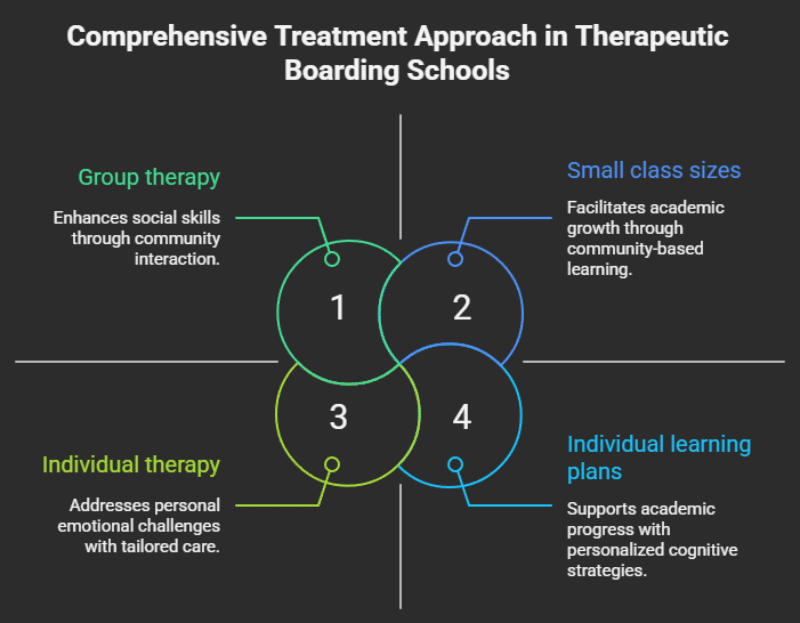When a teen struggles with both emotional or behavioral issues and mental health challenges, their path to recovery can feel even more overwhelming. Parents often find themselves asking — how can my teen get the comprehensive help they truly need?
That’s where Therapeutic Boarding Schools for Troubled Teens make a profound difference. These programs are uniquely designed to address co-occurring disorders (also known as dual diagnoses) by providing integrated treatment that focuses on both emotional healing and behavioral change — all within a structured, supportive environment.
In this article, we’ll explore how therapeutic boarding schools approach co-occurring disorders, what parents should look for in a program, and how these environments help teens find lasting stability and success.
Key Takeaways
- Co-occurring disorders involve both emotional/mental health and behavioral challenges.
- Therapeutic Boarding Schools for Troubled Teens treat both issues simultaneously using integrated therapy, academics, and structure.
- Small classes and trauma-informed teaching help teens regain academic and emotional stability.
- Family participation is vital to lasting recovery.
- Choosing an accredited, licensed program ensures quality care and real progress.
What Are Co-Occurring Disorders?
A co-occurring disorder occurs when a teen experiences both a mental health disorder (like anxiety, depression, or trauma-related issues) and a behavioral or substance-related problem at the same time.
Common examples include:
- Depression combined with substance misuse
- Anxiety paired with self-harm behaviors
- ADHD, along with conduct or defiance issues
- PTSD with social withdrawal or aggression
These overlapping conditions can make treatment more complex because each issue impacts the other. For example, untreated anxiety may drive substance use, while drug use can worsen depression or impulsive behavior.
That’s why a single-focus approach often falls short — and why therapeutic boarding schools take a dual-focus, integrated treatment model.
How Therapeutic Boarding Schools Treat Co-Occurring Disorders
The most effective Therapeutic Boarding Schools for Troubled Teens take a comprehensive, multi-disciplinary approach. This means blending therapy, structure, academics, and wellness into a single, unified plan tailored to each student’s needs.
1. Individualized Therapeutic Treatment
Every student receives a personalized care plan developed by licensed therapists, counselors, and medical professionals. This plan may include:
- Individual therapy for underlying emotional challenges
- Group therapy to build social and communication skills
- Family therapy to repair relationships and support reintegration
- Medication management (when appropriate) under clinical supervision
2. Emotional Regulation and Coping Skills
Teens are taught healthy coping mechanisms to replace destructive habits. Through therapy and structured daily routines, they learn how to manage triggers like anger, anxiety, or impulsivity.
Many programs also include mindfulness, art therapy, or equine therapy, which help students process emotions in constructive ways.
3. Academic Stability and Confidence Building
Healing doesn’t stop in the therapy room — it extends to the classroom. Many teens with co-occurring disorders have fallen behind academically due to emotional distress or absenteeism.
Therapeutic boarding schools provide small class sizes, individual learning plans, and trauma-informed teachers who understand how emotional health impacts learning. This helps students rebuild academic confidence while healing mentally.

| Support Area | Traditional School | Therapeutic Boarding School |
|---|---|---|
| Emotional Care | Limited counseling | Licensed therapy, daily support |
| Academics | Standardized approach | Personalized, flexible pacing |
| Behavior | Punitive measures | Therapeutic interventions |
| Environment | Large, impersonal | Safe, small, supportive community |
The Role of Structure in Treating Co-Occurring Disorders
Structure and routine are vital for teens dealing with overlapping emotional and behavioral challenges. Inconsistent environments can lead to confusion, relapse, or regression.
Therapeutic boarding schools provide:
- Daily schedules balancing academics, therapy, and recreation
- Predictable routines that build accountability and self-discipline
- Peer support systems that reinforce positive behaviors
This steady rhythm helps students feel secure, reduces anxiety, and strengthens emotional resilience.
Family Involvement: Healing Together
One of the most powerful components of therapeutic care is family participation. Co-occurring disorders often strain family relationships, leading to communication breakdowns and resentment.
Therapeutic boarding schools encourage active family involvement through:
- Family therapy sessions (in-person or virtual)
- Parent workshops to understand co-occurring disorders
- Aftercare planning to support the teen’s return home
Families learn how to set healthy boundaries, provide emotional support, and sustain the progress made at school.
Choosing the Right Therapeutic Boarding School
When evaluating a school, parents should look for the following key features:
✅ Licensed clinical staff specializing in dual diagnosis treatment
✅ Accredited academic programs for transferable credits
✅ Small student-to-staff ratio for individualized attention
✅ Comprehensive aftercare to ensure continued support post-graduation
It’s also wise to ask about how the program integrates therapy and education, how progress is measured, and what kind of alumni support systems exist.
Conclusion: Healing the Whole Teen
Teens facing co-occurring disorders need more than discipline or academic catch-up — they need understanding, structure, and specialized care. Therapeutic Boarding Schools for Troubled Teens provide that holistic approach, addressing both the emotional and educational sides of recovery.
These programs give young people the tools to rebuild their self-esteem, manage their emotions, and prepare for a healthy future.
If your teen is struggling with overlapping emotional and behavioral challenges, help is available.
Contact Help Your Teen Now to help your teen now. Our team can guide you toward accredited therapeutic programs that provide the comprehensive care your family needs.






0 Comments